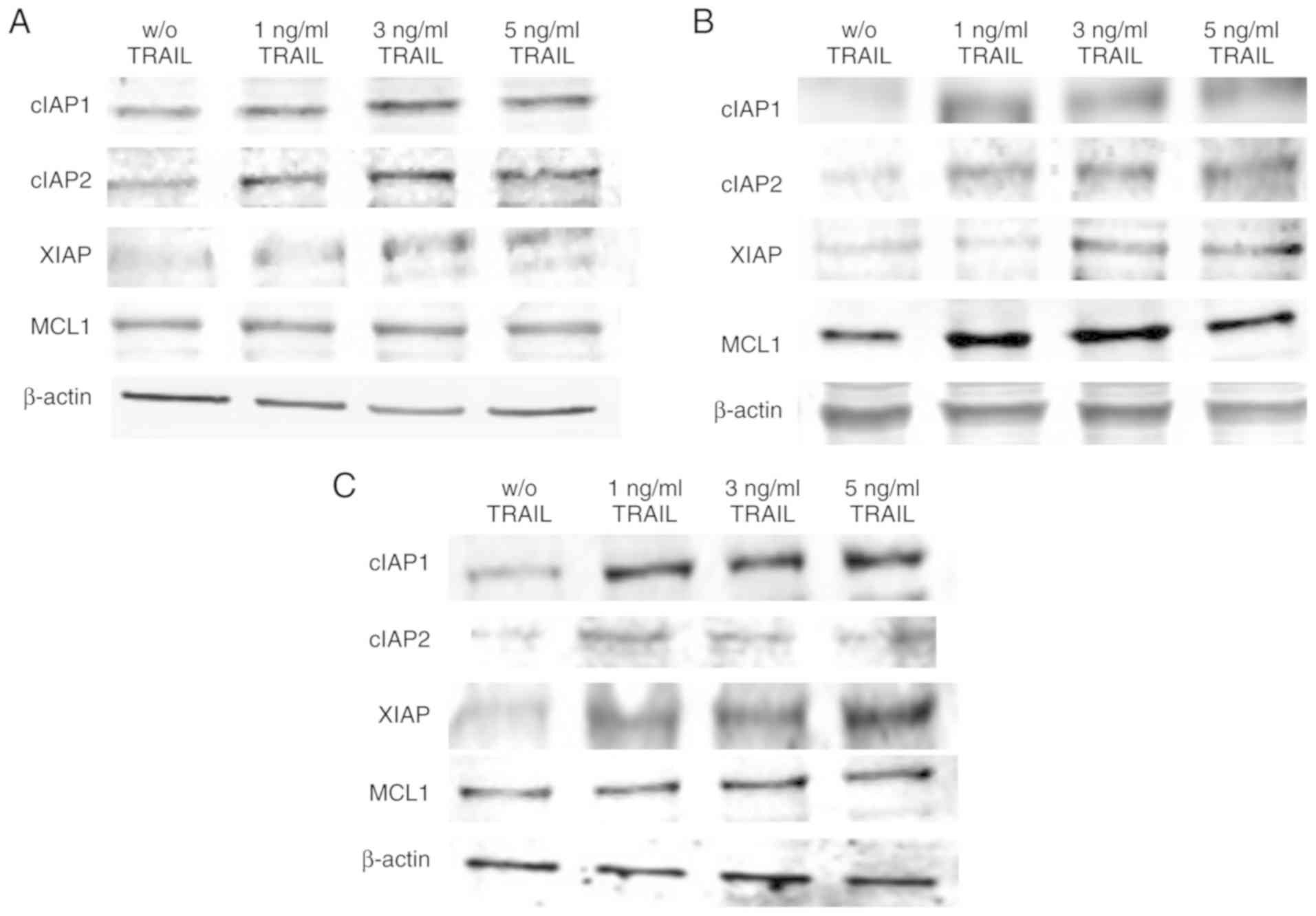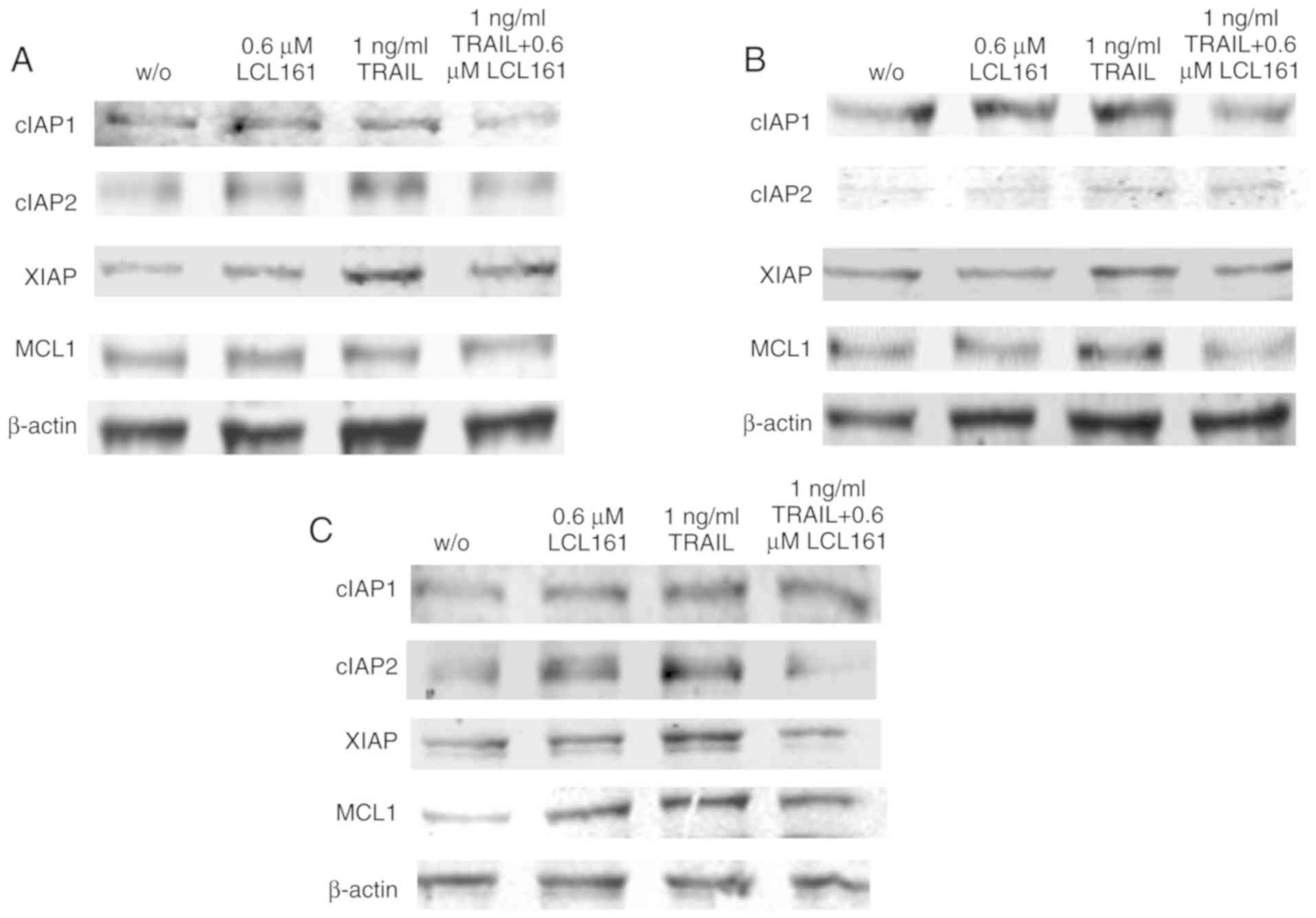|
1
|
von der Maase H, Sengelov L, Roberts JT,
Ricci S, Dogliotti L, Oliver T, Moore MJ, Zimmermann A and Arning
M: Long-term survival results of a randomized trial comparing
gemcitabine plus cisplatin, with methotrexate, vinblastine,
doxorubicin, plus cisplatin in patients with bladder cancer. J Clin
Oncol. 23:4602–4608. 2005. View Article : Google Scholar : PubMed/NCBI
|
|
2
|
Pectasides D, Pectasides M and
Economopoulos T: Systemic chemotherapy in locally advanced and/or
metastatic bladder cancer. Cancer Treat Rev. 32:456–470. 2006.
View Article : Google Scholar : PubMed/NCBI
|
|
3
|
Bellmunt J, Théodore C, Demkov T, Komyakov
B, Sengelov L, Daugaard G, Caty A, Carles J, Jagiello-Gruszfeld A,
Karyakin O, et al: Phase III trial of vinflunine plus best
supportive care compared with best supportive care alone after a
platinum-containing regimen in patients with advanced transitional
cell carcinoma of the urothelial tract. J Clin Oncol. 27:4454–4461.
2009. View Article : Google Scholar : PubMed/NCBI
|
|
4
|
Bellmunt J, Powles T and Vogelzang NJ: A
review on the evolution of PD-1/PD-L1 immunotherapy for bladder
cancer: The future is now. Cancer Treat Rev. 54:58–67. 2017.
View Article : Google Scholar : PubMed/NCBI
|
|
5
|
Carswell EA, Old LJ, Kassel RL, Green S,
Fiore N and Williamson B: An endotoxin-induced serum factor that
causes necrosis of tumors. Proc Natl Acad Sci USA. 72:3666–3670.
1975. View Article : Google Scholar : PubMed/NCBI
|
|
6
|
Tracey KJ, Lowry SF and Cerami A:
Cachetin/TNF-alpha in septic shock and septic adult respiratory
distress syndrome. Am Rev Respir Dis. 138:1377–1379. 1988.
View Article : Google Scholar : PubMed/NCBI
|
|
7
|
Kruyt FA: TRAIL and cancer therapy. Cancer
Lett. 263:14–25. 2008. View Article : Google Scholar : PubMed/NCBI
|
|
8
|
Walczak H, Miller RE, Ariail K, Gliniak B,
Griffith TS, Kubin M, Chin W, Jones J, Woodward A, Le T, et al:
Tumoricidal activity of tumor necrosis factor-related
apoptosis-inducing ligand in vivo. Nat Med. 5:157–163. 1999.
View Article : Google Scholar : PubMed/NCBI
|
|
9
|
Ashkenazi A, Pai RC, Fong S, Leung S,
Lawrence DA, Marsters SA, Blackie C, Chang L, McMurtrey AE, Hebert
A, et al: Safety and antitumor activity of recombinant soluble Apo2
ligand. J Clin Invest. 104:155–162. 1999. View Article : Google Scholar : PubMed/NCBI
|
|
10
|
Dimberg LY, Anderson CK, Camidge R,
Behbakht K, Thorburn A and Ford HL: On the TRAIL to successful
cancer therapy? Predicting and counteracting resistance against
TRAIL-based therapeutics. Oncogene. 32:1341–1350. 2013. View Article : Google Scholar : PubMed/NCBI
|
|
11
|
von Karstedt S, Montinaro A and Walczak H:
Exploring the TRAILs less travelled: TRAIL in cancer biology and
therapy. Nat Rev Cancer. 17:352–366. 2017. View Article : Google Scholar : PubMed/NCBI
|
|
12
|
Steele LP, Georgopoulos NT, Southgate J,
Selby PJ and Trejdosiewicz LK: Differential susceptibility to TRAIL
of normal versus malignant human urothelial cells. Cell Death
Differ. 13:1564–1576. 2006. View Article : Google Scholar : PubMed/NCBI
|
|
13
|
Makin G and Hickman JA: Apoptosis and
cancer chemotherapy. Cell Tissue Res. 301:143–152. 2000. View Article : Google Scholar : PubMed/NCBI
|
|
14
|
Tan ML, Ooi JP, Ismail N, Moad AI and
Muhammad TS: Programmed cell death pathways and current antitumor
targets. Pharm Res. 26:1547–1560. 2009. View Article : Google Scholar : PubMed/NCBI
|
|
15
|
Protzel C and Hakenberg OW: Emerging
apoptosis agonists for bladder cancer. Expert Opin Emerg Drugs.
14:607–618. 2009. View Article : Google Scholar : PubMed/NCBI
|
|
16
|
Chen KF, Lin JP, Shiau CW, Tai WT, Liu CY,
Yu HC, Chen PJ and Cheng AL: Inhibition of Bcl-2 improves effect of
LCL161, a SMAC mimetic, in hepatocellular carcinoma cells. Biochem
Pharmacol. 84:268–277. 2012. View Article : Google Scholar : PubMed/NCBI
|
|
17
|
Fulda S and Vucic D: Targeting IAP
proteins for therapeutic intervention in cancer. Nat Rev Drug
Discov. 11:109–124. 2012. View
Article : Google Scholar : PubMed/NCBI
|
|
18
|
Infante JR, Dees EC, Olszanski AJ, Dhuria
SV, Sen S, Cameron S and Cohen RB: Phase I dose-escalation study of
LCL161, an oral inhibitor of apoptosis proteins inhibitor, in
patients with advanced solid tumors. J Clin Oncol. 32:3103–3110.
2014. View Article : Google Scholar : PubMed/NCBI
|
|
19
|
Fulda S: Molecular pathways: Targeting
inhibitor of apoptosis proteins in cancer-from molecular mechanism
to therapeutic application. Clin Cancer Res. 20:289–295. 2014.
View Article : Google Scholar : PubMed/NCBI
|
|
20
|
Michaelis M, Rothweiler F, Barth S, Cinatl
J, van Rikxoort M, Löschmann N, Voges Y, Breitling R, von Deimling
A, Rödel F, et al: Adaptation of cancer cells from different
entities to the MDM2 inhibitor nutlin-3 results in the emergence of
p53-mutated multi-drug resistant cancer cells. Cell Death Dis.
2:e2432011. View Article : Google Scholar : PubMed/NCBI
|
|
21
|
Riccioni R, Pasquini L, Mariani G, Saulle
E, Rossini A, Diverio D, Pelosi E, Vitale A, Chierichini A, Cedrone
M, et al: TRAIL decoy receptors mediate resistance of acute myeloid
leukemia cells to TRAIL. Haematologica. 90:612–624. 2005.PubMed/NCBI
|
|
22
|
Morizot A, Mérino D, Lalaoui N, Jacquemin
G, Granci V, Iessi E, Lanneau D, Bouyer F, Solary E, Chauffert B,
et al: Chemotherapy overcomes TRAIL-R4-mediated TRAIL resistance at
the DISC level. Cell Death Differ. 18:700–711. 2011. View Article : Google Scholar : PubMed/NCBI
|
|
23
|
Wang W, Zhang M, Sun W, Yang S, Su Y,
Zhang H, Liu C, Li X, Lin L, Kim S, et al: Reduction of Decoy
receptor 3 enhances TRAIL-mediated apoptosis in pancreatic cancer.
PLoS One. 8:e742722013. View Article : Google Scholar : PubMed/NCBI
|
|
24
|
Li Y, Jin X, Li J, Jin X, Yu J, Sun X, Chu
Y, Xu C, Li X, Wang X, et al: Expression of TRAIL, DR4, and DR5 in
bladder cancer: Correlation with response to adjuvant therapy and
implications of prognosis. Urology. 79:968.e7–e15. 2012. View Article : Google Scholar
|
|
25
|
Suzman DL, Agrawal S, Ning YM, Maher VE,
Fernandes LL, Karuri S, Tang S, Sridhara R, Schroeder J, Goldberg
KB, et al: FDA approval summary: Atezolizumab or pembrolizumab for
the treatment of patients with advanced urothelial carcinoma
ineligible for cisplatin-containing chemotherapy. Oncologist.
24:563–569. 2019. View Article : Google Scholar : PubMed/NCBI
|
|
26
|
O'Kane HF, Watson CJ, Johnston SR, Petak
I, Watson RW and Williamson KE: Targeting death receptors in
bladder, prostate and renal cancer. J Urol. 175:432–438. 2006.
View Article : Google Scholar : PubMed/NCBI
|
|
27
|
Sharma SV, Haber DA and Settleman J: Cell
line-based platforms to evaluate the therapeutic efficacy of
candidate anticancer agents. Nat Rev Cancer. 10:241–253. 2010.
View Article : Google Scholar : PubMed/NCBI
|
|
28
|
Domingo-Domenech J, Vidal SJ,
Rodriguez-Bravo V, Castillo-Martin M, Quinn SA, Rodriguez-Barrueco
R, Bonal DM, Charytonowicz E, Gladoun N, de la Iglesia-Vicente J,
et al: Suppression of acquired docetaxel resistance in prostate
cancer through depletion of notch- and hedgehog-dependent
tumor-initiating cells. Cancer Cell. 22:373–388. 2012. View Article : Google Scholar : PubMed/NCBI
|
|
29
|
Murtaza M, Dawson SJ, Tsui DW, Gale D,
Forshew T, Piskorz AM, Parkinson C, Chin SF, Kingsbury Z, Wong AS,
et al: Non-invasive analysis of acquired resistance to cancer
therapy by sequencing of plasma DNA. Nature. 497:108–112. 2013.
View Article : Google Scholar : PubMed/NCBI
|
|
30
|
Vallo S, Michaelis M, Rothweiler F,
Bartsch G, Gust KM, Limbart DM, Rödel F, Wezel F, Haferkamp A and
Cinatl J Jr: Drug-resistant urothelial cancer cell lines display
diverse sensitivity profiles to potential second-line therapeutics.
Transl Oncol. 8:210–216. 2015. View Article : Google Scholar : PubMed/NCBI
|
|
31
|
Mani J, Vallo S, Rakel S, Antonietti P,
Gessler F, Blaheta R, Bartsch G, Michaelis M, Cinatl J, Haferkamp A
and Kögel D: Chemoresistance is associated with increased
cytoprotective autophagy and diminished apoptosis in bladder cancer
cells treated with the BH3 mimetic (−)-Gossypol (AT-101). BMC
Cancer. 15:2242015. View Article : Google Scholar : PubMed/NCBI
|
|
32
|
Metwalli AR, Khanbolooki S, Jinesh G,
Sundi D, Shah JB, Shrader M, Choi W, Lashinger LM, Chunduru S,
McConkey DJ, et al: Smac mimetic reverses resistance to TRAIL and
chemotherapy in human urothelial cancer cells. Cancer Biol Ther.
10:885–892. 2010. View Article : Google Scholar : PubMed/NCBI
|
|
33
|
Szliszka E, Mazur B, Zydowicz G, Czuba ZP
and Król W: TRAIL-induced apoptosis and expression of death
receptor TRAIL-R1 and TRAIL-R2 in bladder cancer cells. Folia
Histochem Cytobiol. 47:579–585. 2009.PubMed/NCBI
|
|
34
|
Jinesh GG, Chunduru S and Kamat AM: Smac
mimetic enables the anticancer action of BCG-stimulated neutrophils
through TNF-α but not through TRAIL and FasL. J Leukoc Biol.
92:233–244. 2012. View Article : Google Scholar : PubMed/NCBI
|
|
35
|
Foster FM, Owens TW, Tanianis-Hughes J,
Clarke RB, Brennan K, Bundred NJ and Streuli CH: Targeting
inhibitor of apoptosis proteins in combination with ErbB
antagonists in breast cancer. Breast Cancer Res. 11:R412009.
View Article : Google Scholar : PubMed/NCBI
|
|
36
|
Fulda S, Meyer E and Debatin KM:
Inhibition of TRAIL-induced apoptosis by Bcl-2 overexpression.
Oncogene. 21:2283–2294. 2002. View Article : Google Scholar : PubMed/NCBI
|
|
37
|
Han J, Goldstein LA, Gastman BR and
Rabinowich H: Interrelated roles for Mcl-1 and BIM in regulation of
TRAIL-mediated mitochondrial apoptosis. J Biol Chem.
281:10153–10163. 2006. View Article : Google Scholar : PubMed/NCBI
|
|
38
|
Chen X, Wang T, Yang D, Wang J, Li X, He
Z, Chen F, Che X and Song X: Expression of the IAP protein family
acts cooperatively to predict prognosis in human bladder cancer
patients. Oncol Lett. 5:1278–1284. 2013. View Article : Google Scholar : PubMed/NCBI
|
|
39
|
Wang J, Zeng F, Wang L, Zhu Z and Jiang G:
Synthetic Smac peptide enhances chemo-sensitivity of bladder cancer
cells. J Huazhong Univ Sci Technolog Med Sci. 28:304–307. 2008.
View Article : Google Scholar : PubMed/NCBI
|
|
40
|
Yang D, Song X, Zhang J, Ye L, Wang S, Che
X, Wang J, Zhang Z, Wang L and Shi W: Therapeutic potential of
siRNA-mediated combined knockdown of the IAP genes (Livin, XIAP,
and Survivin) on human bladder cancer T24 cells. Acta Biochim
Biophys Sin (Shanghai). 42:137–144. 2010. View Article : Google Scholar : PubMed/NCBI
|
|
41
|
Griffith TS, Kucaba TA, O'Donnell MA,
Burns J, Benetatos C, McKinlay MA, Condon S and Chunduru S:
Sensitization of human bladder tumor cells to TNF-related
apoptosis-inducing ligand (TRAIL)-induced apoptosis with a small
molecule IAP antagonist. Apoptosis. 16:13–26. 2011. View Article : Google Scholar : PubMed/NCBI
|
|
42
|
Houghton PJ, Kang MH, Reynolds CP, Morton
CL, Kolb EA, Gorlick R, Keir ST, Carol H, Lock R, Maris JM, et al:
Initial testing (stage 1) of LCL161, a SMAC mimetic, by the
pediatric preclinical testing program. Pediatr Blood Cancer.
58:636–639. 2012. View Article : Google Scholar : PubMed/NCBI
|


















